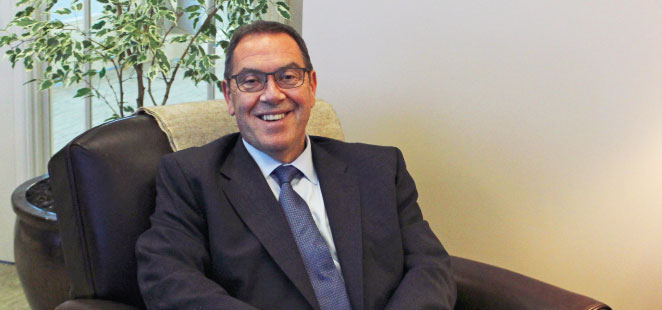Are you ahead of your health?

Moda Health’s Robin Richardson has an important lesson for men of all ages — don’t let your health get away from you. It’s a fairly simple message, but something the senior vice president has learned after experiencing a couple of unexpected coronary events
His journey began with a hunch that something wasn’t quite right.
“I knew I wasn’t in the shape that I used to be in, but I didn’t think I was in bad shape,” he said. “I knew at some point that I needed to make some changes, but I didn’t have time to do anything about it.”
Time, as it turns out, was ticking for Robin. And ticking fast. Although his health suspicions were based on a hunch, he knew it was affecting him. “I felt so tired during the day. I would fall asleep at my desk. It got so bad that I was afraid to drive home because I thought I might fall asleep at the wheel.”
Although there was nothing specific he could point to, he soon found himself out of breath in normal situations. Listening to his wife’s concerns about his health, he decided to see his doctor. His vitals were all fine, but his doctor wasn’t satisfied. He wanted to run some tests to rule out a few things.
An unexpected emergency
One of the tests was a cardiac stress test, which measures how the heart handles exercise. But before that, the doctor wanted to do an echocardiogram (a heart ultrasound that measures the heart function). After performing the echocardiogram several times, Robin said his doctors left the room. It’s safe to say that Robin was not prepared for what came next.
“When they returned, they told me they were not going to do the stress test,” he said. “Instead, they informed me that I had experienced a recent coronary event and that an ambulance was waiting outside to take me to the emergency room.”
At the hospital, an angiogram (a heart X-ray) showed that he had no blocked coronary arteries. But the doctors still had no idea what triggered his coronary event. What the echocardiogram did discover was that his heart was pumping blood at half the normal volume (30% of the normal 50-70%). This meant he was suffering from heart failure.
At the rate his heart was functioning, his doctor told him that medications could help improve his condition. However, in most cases like his, the heart rate either stays the same or gets worse. If it got any worse, his only option would be to have a heart transplant.
Fear of the unknown
Robin asked his cardiologist to be as aggressive clinically as possible. He agreed, and began adjusting his medications every few weeks. However, because his heart rate and blood pressure were so low with his meds at lower levels, his doctor said they could not continue doing this and stopped.
Still not knowing what caused his heart failure, his doctors had no clear plan for him.
“They were just reacting to each of my symptoms to see what would work,” he said. “My colleagues kept asking me what my plan was. All I could say was, ‘I don’t have a plan. I didn’t know what do to.’ That was scary.”
Receiving different prescriptions from different doctors, he also felt like no one was really taking care of him. Frustrated, he told his cardiologist that he didn’t feel like it was a good fit for him. The cardiologist helped him find a new provider, but that provider didn’t work out, either. After everything he’d been through, he didn’t have a plan or a cardiologist to treat him.
A lifesaving discovery
Another episode landed him back in the ER, and again, his vitals checked out. Just before he was to be released from the hospital, they discovered that his gallbladder was full of gangrene and removed it.
“I remember coming out of surgery thinking, ‘Wow, there’s no pain,’ ” he said. “If they would have discharged me any earlier, I probably would have went septic, and my heart wouldn’t have been able to handle it. I probably would have died.”
A colleague helped him find a new cardiologist who performed another echocardiogram. To everyone’s surprise, his heart functions had improved to 35-40%. “He told me to keep doing what I was doing and to come back and see him in six months.”
While this wasn’t exactly the aggressive approach he wanted, his doctor recommended using an app to track and report his pulse, blood pressure and weight each day. He also took matters into his own hands with the only thing he could do for himself — lose weight. Sticking to a strict low sodium, low calorie diet with less processed foods, in just over a year’s time he lost 85 pounds and felt more energized.
While he continues to work with his doctor and cardiologist to monitor an electrical problem with his heart, things are looking better. The good news is his heart function has gone from half of normal to just below normal, despite still not knowing what caused his heart failure in the first place.
Throughout this experience, Robin has learned some valuable lessons that he wants to share with others. They include:
- Find a good primary care provider: An engaged primary care provider (PCP) can be an advocate for your health and a constant resources for your care. His PCP was interested in how he was doing and always knew exactly where he was with everything at any given point in time. Simply put, his PCP saved his life.
- Have a plan: While doctors may not have all the answers, knowing that they have a plan and are taking timely steps to find a solution is critical to your health and peace of mind. Every time he told his colleagues there was no plan in place, he grew more frustrated and anxious.
- Shop around. If you don’t feel your provider is the right fit for you or you want to look into other facilities or clinics, take the initiative yourself. Checking out other facilities and making calls helped him book appointments faster and start his cardiac rehab sooner.
- Listen to others/speak up: In hindsight, if someone had mentioned he didn’t look well, he might have seen his doctor earlier. On the flip side, he would advise others to ask friends who don’t look right how they are feeling. Speaking up could save someone’s life.
- Better access to care: Oftentimes people don’t know what to do or where to turn when they’re not feeling well. At Moda Health, our goal is to make sure people can access critical resources and tools that help them get the care they need.
- Get ahead of your health: Don’t let your health get away from you. It can be a slow, gradual process, which is why it’s important to be proactive and make time for annual checkups. If you sense something is wrong, the longer you delay in getting help, the more you are putting yourself at risk.
Robin added that having someone by your side to ask questions, encourage you to seek alternatives, and help you stay on top of your medications and treatment can play a key role when facing a health crisis.
“When you’re going through a lot of changes with your own health, you don’t realize the toll it can have on your partner,” he said. “At least I was getting treated, whereas my wife worried all the time if I would be okay just riding my bike. She has been a big advocate for my health and has been there with me through it all. I don’t know if I would be here if I didn’t have her by my side.”
Moda Health Months: Our personal health stories Read more personal health stories on our Moda Health Community page.

Hello.
We have exciting news to share. ODS is changing its name to Moda Health.
Moda comes from the latin term "modus" and means "a way". We picked it because that's what we are here to do: help our communities find a way to better health.
Together, we can be more, be better.
Please select the state you live in, or the state where your employer is headquartered, so we can tailor your experience:

Hello.
Please select the state you live in, or the state where your employer is headquartered, so we can tailor your experience:
Privacy notice
We use cookies and similar analytics technologies to understand how visitors interact with our website, improve performance, and enhance user experience. These tools help us analyze traffic patterns and usage trends.
We do not collect or store personal information, track users for advertising purposes, or use social media plugins.
By continuing to use this site, you acknowledge our use of cookies for analytics purposes only. For more information, please refer to our Privacy Policy.
Changing your location to Oregon
You can return to your previous location in the site header.
